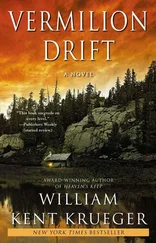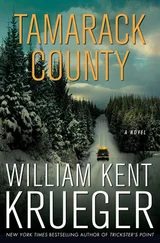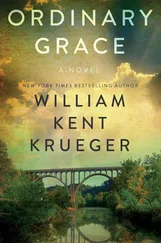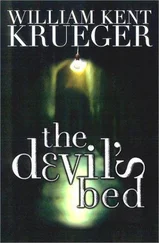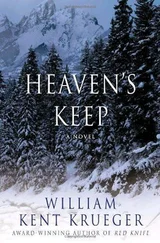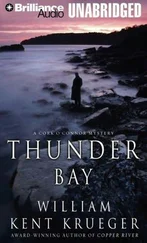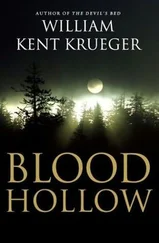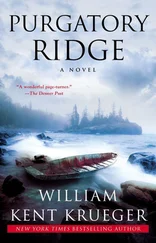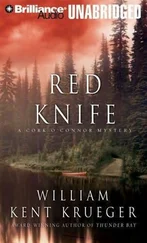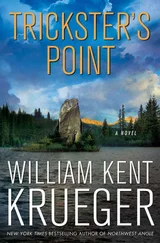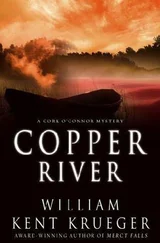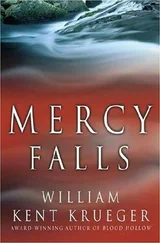Then Meloux was standing above them, the woman’s rifle in his hands. He spoke in a voice of such clear authority that all motion stopped instantly.
“Enough. It is finished. Be still.” When he saw that his words had been heeded, Meloux said, “Take his rifle, Stephen, and hand it to me.”
Stephen, who already had a firm grip on the firearm, yanked it from Hornett’s grasp and delivered it to Meloux. The old man opened the cabin door and stood at the threshold. He flung first one rifle then the other far out into the meadow grass. After that, he lifted his arms and crossed and uncrossed them several times above his head in a sign that all was now safe.
Through the doorway, Jenny saw figures in blue Kevlar emerge from the woods and begin to cross the meadow. Waaboo screamed, and she held him against her and spoke to him quietly. “Don’t cry, little rabbit. Don’t cry. It’s all over. We’re safe now.”
Stephen stood poised above Hornett, prepared to battle him again should he rise. It wasn’t necessary. The man lay on the floor and stared upward, dazed and dumb in defeat.
“Uncle Henry, let me see your hand,” Rainy said. She went to Meloux and looked at the palm he’d held over the stove.
“We need to get you to a hospital,” she said firmly.
“Niece,” Meloux replied, “have I taught you nothing about healing?” Then he smiled. “Two hours ago, I thought I was dead. Yet here I am alive. What is a little puckered flesh to me?”
“Mishomis,” Stephen said. “I never heard of that warrior’s test.”
“Until the words came from my mouth,” the old man said, “neither had I.”
Jenny heard her father call from outside. A moment later, he was in the doorway, standing next to Henry and Rainy, with the sheriff’s officers pressing in at his back.
“Thank God you knew what I meant, Henry,” he said.
“What did you mean, Dad?” Stephen asked.
First his father gave him a powerful hug, then explained. “ Ishkode, one kind of fire, the kind that burns in Henry’s fire ring. Baashkiz, another kind of fire. To fire a gun.”
“Your Ojibwe needs work, Corcoran O’Connor,” Meloux said. “But I understood.” He lowered his eyes to the woman dead on his floor. “It is good for us that she did not.”
Her father came at last to where Jenny sat with Waaboo crying in her arms.
“You and our little guy, you’re both okay?”
“ Our little guy?” she said.
“Whatever it takes, Jenny, we’ll give this child a home, I promise.” He looked the cabin over, then asked, “Aaron?”
“He tried to lead them away from us. He didn’t have to, but he did.” She shook her head and said at last the words that, because of the circumstances and her own need to stay focused, she hadn’t even allowed herself to think. “He’s dead. They killed him, Dad.”
Tears spilled from her eyes so suddenly that she was caught by surprise. She couldn’t tell if it was grief for Aaron. Or relief at being saved. Or her deep fear, despite her father’s assurance, that now that the danger was past, she might very soon have to give up this child whom she loved as if he were her own.
She cried so hard that she couldn’t speak. She held so tightly to her baby that no one could have taken him from her.
EPILOGUE
November arrived, and there was not yet snow in Tamarack County or in any part of northern Minnesota or across the border in southern Manitoba and Ontario. This was unusual, though not unheard of, and it greatly simplified the travel of those who’d come from Lake of the Woods for the Naming Ceremony.
Crow Point that afternoon lay under a sky completely covered by low clouds the color of an old nickel. There was no precipitation in the forecast, however, and hardly a breath of wind. Although the temperature hovered just below fifty degrees, there was a festive feel among those gathered in the meadow in front of Meloux’s cabin. The air was redolent with the aromas of fry bread and savory meats and hot dish made from wild rice. Rose and Rainy had been cooking on the woodstove all morning, and many of the guests had brought food to share as well. Tables had been set in the meadow and were already filled with casserole dishes and salads and desserts waiting to be served onto paper plates.
Smoke drifted up from beyond the outcropping of rock near the end of the point, and at a given signal everyone who milled about the meadow made their way in that direction. Rose walked with Mal and Rainy and Tom Kretsch, who was still recovering from a bullet wound to his right leg and used a cane. Stephen and Jenny and Anne and Cork were already at the fire, along with Henry Meloux. Amos Powassin was with them, standing next to his old friend, smiling blindly.
For nearly two months, Jenny and Cork had dealt with the bureaucracies on both sides of the border. Because it was impossible to prove the baby’s true birthplace, and because the mother’s last known residence had been Stump Island, the Canadian authorities finally agreed that they had no authority over or responsibility for Lily Smalldog’s child. At which point, it fell to the Tamarack County social services to deal fully with the disposition of the baby. At first, there’d been some question whether things would be complicated by the Indian Child Welfare Act. But Lily Smalldog’s tribal affiliation would have been with the Reserve 37 Ojibwe, where she’d never actually been an enrolled member, and so the court chose to treat her case as a routine adoption. The baby’s father, Joshua Hornett, was sitting in the maximum security facility at St. Cloud awaiting trial on a number of federal charges. He’d been more than cooperative in signing the consent to adoption, in which he gave up all parental rights. A dozen members of the Church of the Seven Trumpets were there with him, also awaiting trial. Seth Bascombe was being held separately, locked away in the correctional facility in Oak Park Heights, mostly for his own safety, because in exchange for leniency, he’d agreed to testify against his former cohorts.
Most fortunate was that, from the beginning, Tamarack County Judge Randalyn Nickelsen had overseen Waaboo’s welfare. She’d known Cork and his family forever, and when she understood the whole story of what they’d all risked for the child, she’d done her best to expedite the adoption process. She’d signed the county’s petition for protective services for Waaboo and had placed him temporarily in Jenny’s care. She saw to it that the requisite home study was completed with due haste and, in the end, had been the one to grant Jenny’s petition for adoption. Within two months of her return to Tamarack County, Jenny had, legally, become a mother.
The Sunday before the gathering on Crow Point, the child had been baptized at St. Agnes in Aurora. In the christening, Father Green had used the boy’s legal name, Aaron Smalldog O’Connor. The Naming Ceremony on Crow Point was an important Ojibwe ritual, one that would complete the process of bringing the baby into a family that embraced and celebrated its mixed heritage.
The only egregious absence at the gathering was that of Noah Smalldog, who’d been killed in the exchange of gunfire on Oak Island. The O’Connors and Rose and Mal had been present at his burial on Windigo Island and had watched as the Ojibwe there put tobacco between his fingers and placed a spirit dish in the coffin and closed the lid and lowered it into the earth. Now, on this overcast November day, as she gathered with the others around Meloux’s fire ring, Rose couldn’t help thinking about the observation Amos Powassin had made weeks earlier amid all the destruction on Lake of the Woods. He’d said that in everything good was the potential for evil, and in everything evil the potential for good. She had known Noah Smalldog for only a very short time. He’d held a knife to her throat and drawn her blood, and she’d been certain that he would have killed her without hesitation if doing so would have served his purpose. He was a man filled with anger, who had no use for chimooks, yet he’d willingly sacrificed himself for her and the others. And she thought about the terrible storm that had begun it all, the derecho. It had been a great destroyer, but it had also, in the end, been responsible for beautiful little Waaboo entering their lives. And last, she thought about Abigail Hornett and the Church of the Seven Trumpets, who’d taken the words of a man of peace and found in them justification for horrible violence.
Читать дальше

